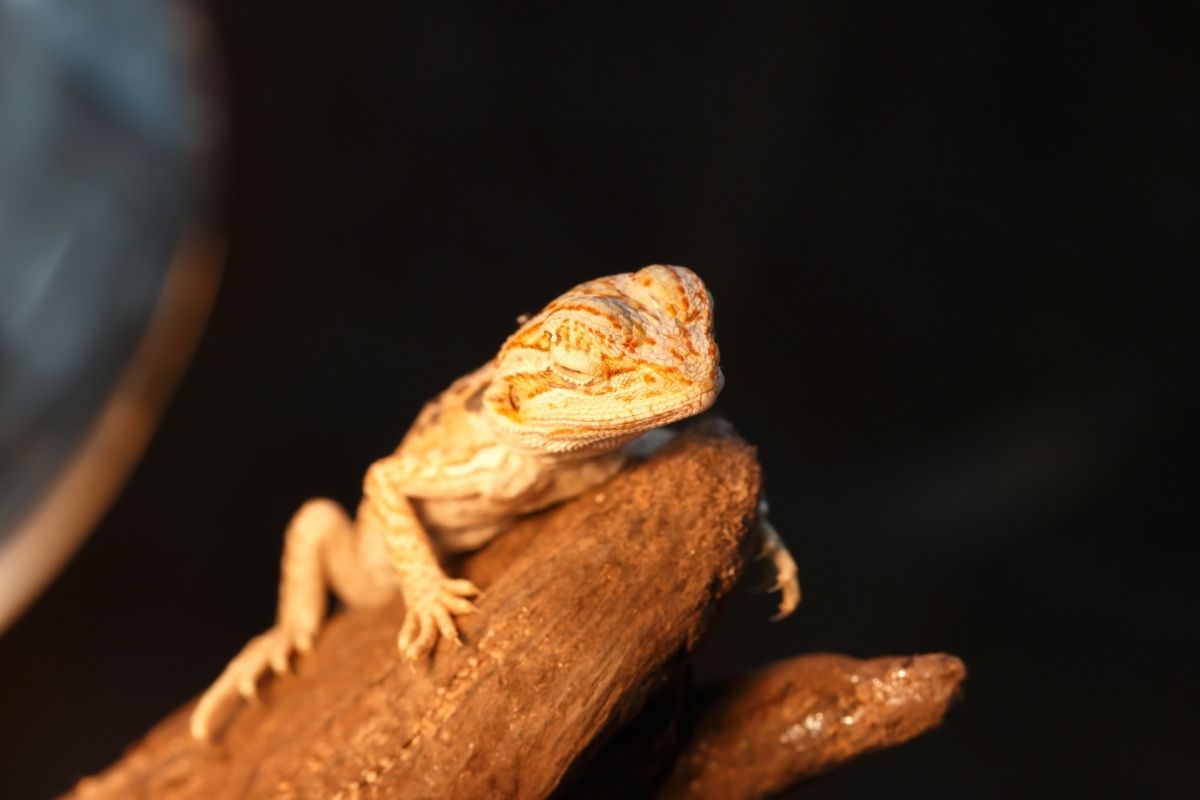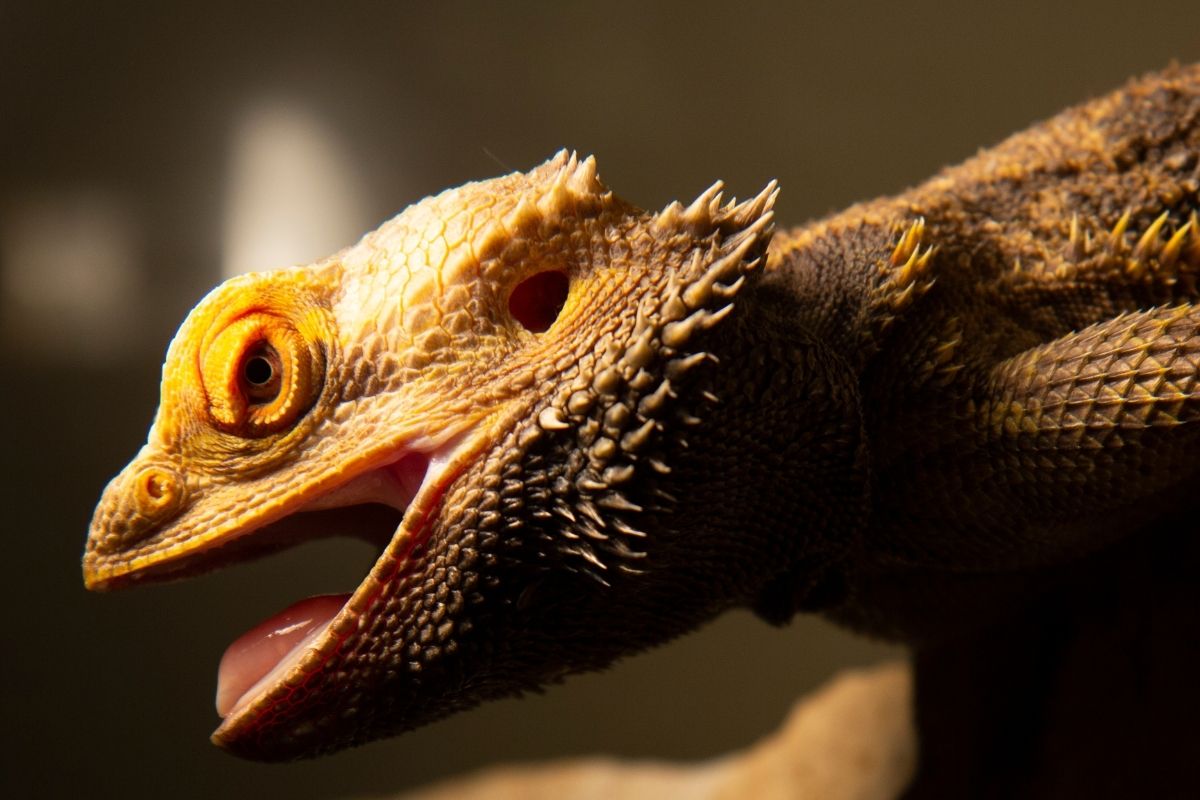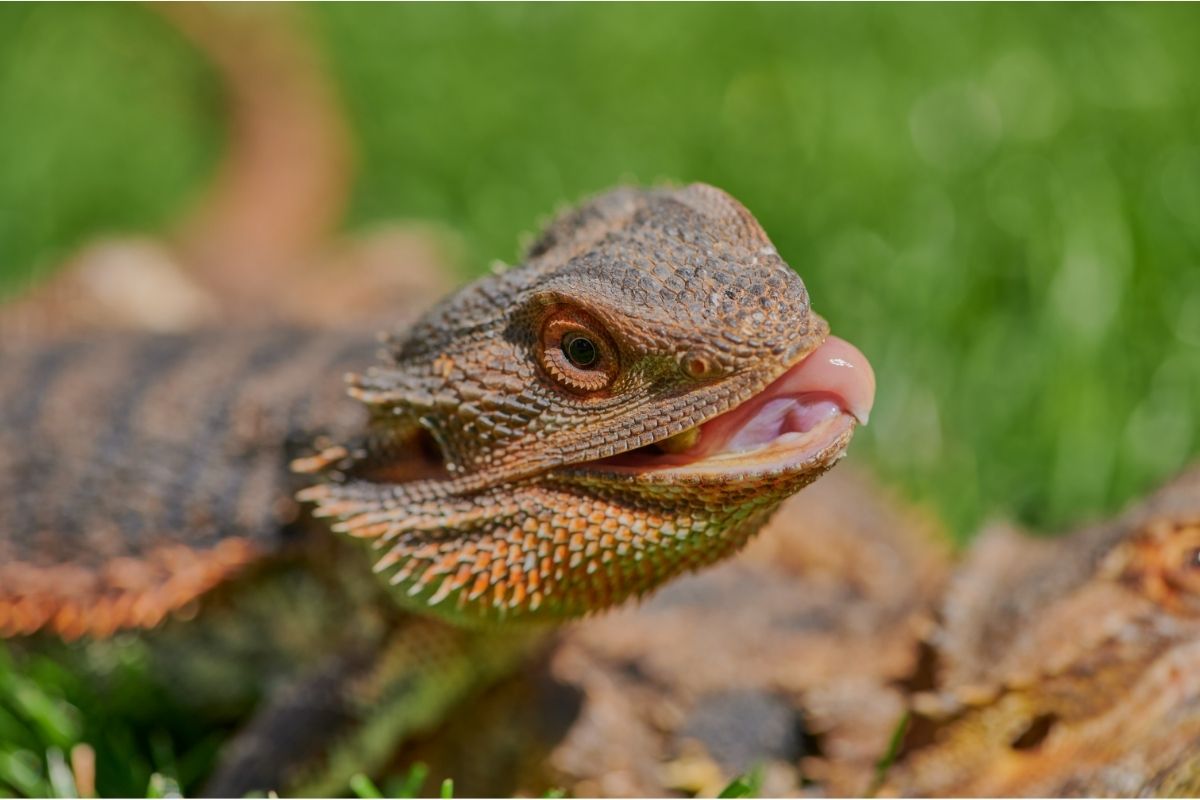If you’re thinking about getting a bearded dragon, then you should know that they are extremely active during the day and will need to be kept in an area with lots of light.
However, many bearded dragon owners are unsure whether their bearded dragon needs light at night or not.

The simple and quick answer to this question is no. Bearded dragons are diurnal creatures which means that they are active during the day and sleep at night.
By having the light on all the time, you are disrupting their normal circadian rhythm.
In this article, we are going to explore the lighting requirements of a bearded dragon and much more. So, let’s get started!
What Was The Bearded Dragon’s Habit Like In The Wild?
Bearded dragons originally come from Central America and South America but are also found in tropical areas of Asia.
In their natural environment, the lighting conditions were very different from what they experience now.
It is important to understand how a bearded dragon lives in its natural habitat before trying to recreate it indoors.
The most essential thing about this article is that we will discuss the various ways in which you can provide your bearded dragon with light at night.
The climate where beardies live is generally warm and humid.
Bearded dragons do not need direct sunlight during the day as they have lots of melanin in their skin to absorb the sun’s rays.
However, at night when temperatures drop, they need to be kept away from sources of heat such as lamps or radiators.
This is because they can get overheated quickly if exposed to direct sunlight.
Keeping them out of direct sunlight at night will help them avoid getting too hot.
They should never be left alone at night since they may become disoriented due to lack of sleep.
As an alternative to keeping them in an enclosure at night, we recommend having a small terrarium that has a lid for easy access.
Lighting And Temperature Requirements As Pets
Many people think that bearded dragons do not require any special lighting conditions. However, this is not true.
For instance, it is recommended that you keep them on a dimmer setting, around 70-75%, so that they don’t get overexposed.
You should also make sure there is sufficient ventilation in your room so that the air doesn’t feel stuffy.
If you want to keep them inside all the time, try using a diffuser to diffuse the light. A fan can also help by circulating the air.
You should also pay attention to the temperature in your home.
Temperatures between 65–75 degrees Fahrenheit (18–24 degrees Celsius) work best for bearded dragons.
If you prefer, you can use a thermostat to control the temperature. Alternatively, there are many heating mats available online that can help regulate the temperature.
How Do I Know What Lighting Level Is Best?
There are several factors that determine the ideal lighting level for your bearded dragon. These include:
Your Bearded Dragon’s Age – Younger baby bearded dragons tend to be more active throughout the day and thus require less light.
Older bearded dragons usually stay closer to the ground, making them harder to see.
Therefore, the amount of light needed will change depending on your bearded dragon’s age.
Your Bearded Dragon’s Activity Level – Some bearded dragons are nocturnal, while others are diurnal.
Nocturnal species, like the arboreal species and some semiarboreal species, need less light at night.
Diurnal bearded dragons will be more active during the day and therefore require less light at night.
Bearded Dragons And Basking Light
If you are planning on basking your bearded dragon in a cage that allows basking light, then you must ensure that the cage does not block a majority of the light coming through the window.
Otherwise, the bearded dragon may bask for hours without ever moving.
Instead, consider putting a piece of cardboard over the top of the cage so that only 1/3rd of the light comes through.
Also, remember to rotate the cage so that the bearded dragon always faces toward the light source.
Do Bearded Dragons Need Heat In The Night?

Some people believe that bearded dragons need heat at night to survive. But this isn’t true.
Although it is important to provide adequate shelter from rain and wind, it’s not essential to provide heat at night.
In fact, most bearded dragons thrive with no heat at night. The reason they don’t need heat at night is because they are already very active during the daytime.
During the cooler times of the year, their activity levels increase even further.
Thus, if you did decide to provide heat at night, you would probably have to turn up the dial higher than when they are awake.
Circadian Rhythm
All reptiles follow a circadian rhythm. This means that they go through cycles of sleep and wakefulness every day.
Since bearded dragons’ lives revolve around eating and sleeping, they naturally fall into these patterns.
They typically eat in the morning and rest in the afternoon. Their resting periods are about 3 hours long.
When they’re awake, they move around but spend most of their time sleeping.
In addition to their natural circadian cycle, bearded dragons also have an internal clock that helps regulate their daily activities.
There are two types of circadian rhythms – ultradian and circadian.
Ultradian rhythms occur within minutes or hours, whereas circadian rhythms occur on a longer timescale.
For example, a female lizard’s body temperature rises as she gets ready to mate and cools down after giving birth.
Why Unsuited Lighting Can Be Bad
To ensure that your bearded dragon has everything it needs to grow healthy and happy, it’s important to understand what lighting works best for them.
If you look for a specific type of light bulb, you could end up selecting one that doesn’t meet the needs of your bearded dragon.
For example, fluorescent bulbs are great for growing plants indoors. But they aren’t really designed to mimic sunlight.
Therefore, they won’t do any good for bearded dragons. You want to select lights that mimic sunlight. These include:
Tungsten bulbs (warm white)
T8 bulbs (cool white)
LED bulbs (white and colored)
What About UV Lights?
UV light is another option for reptile owners who are looking for additional sources of artificial lighting.
However, remember that some lizard breeds are sensitive to UV rays.
It’s possible that the extra exposure will cause problems such as skin irritation, sunburn, and eye damage.
Because of this, UV lights should only be used under close supervision by experienced breeders.
There are also UVB bulbs, which emit ultraviolet rays, and are often used to treat fungal infections on amphibians.
Some breeders use them to sterilize eggs before hatching.
However, UVB bulbs shouldn’t be used on bearded dragons because their eyes are particularly susceptible to injury.
The Importance Of Sunlight

Although most bearded dragons live well without direct sunlight, many prefer to bask in the warmth of a sunny window.
However, they need direct sunlight to produce vitamin D. vitamin D is necessary for proper bone development and growth.
To get enough vitamin D, you’ll need to expose your bearded dragon to 10-20 minutes of direct sunlight each day.
If you see your bearded dragon basking in the sun and getting plenty of vitamin D, then you know that it’s doing fine.
But if he seems listless or lethargic, you may have to consider increasing his exposure to sunlight.
How Much Shade Do Bearded Dragons Require?
Bearded dragons don’t require much shade during the summer months. In fact, they enjoy being outside even when it’s hot.
As long as they have access to adequate water, they’ll thrive in temperatures above 90 degrees Fahrenheit.
Some species of bearded dragons are able to survive heat levels as high as 120 degrees.
During cold weather, however, bearded dragons like to stay inside with minimal amounts of direct sunlight.
They need protection from drafts and extreme temperatures; therefore, you’ll need to provide a climate-controlled environment.
The ideal temperature range is between 55 and 70 degrees F.
Frequently Asked Questions
In this section, we have answered several questions concerning bearded dragons and the lighting conditions they require.
From how much light to whether beardies need light at night, we aim to answer a variety of questions here for your benefit. So, let’s get started!
Should You Turn Your Bearded Dragon’s Light off At Night?
It depends on where you live. For example, if you’re located in an area with mild winters, you might not need to turn your bearded dragon’s lights off at night.
This can help prevent excessive shedding and allow your bearded dragon to maintain its natural coloration.
You need to remember that you are trying to mimic the natural heat and light patterns that a bearded dragon would have in their natural habitat.
If you want to give your bearded dragon a more naturalistic look, then you’ll want to mimic those natural conditions.
Can I Use Incandescent Bulbs Or CFLs With My Bearded Dragon?
Incandescent bulbs aren’t recommended because they emit too much heat.
Although they last longer than regular fluorescent bulbs, they also emit less light.
CFLs are better options since they use less energy and emit less heat.
CFLs are available in different wattages depending on what size bulb you’d like. We recommend using bulbs with a minimum of 60 watts.
That way, you’ll be able to provide your bearded dragon with just enough light to be comfortable.
Do Bearded Dragons Need Heat lamps?
Heat lamps are great for heating up a small space, but they aren’t really needed for bigger spaces.
Bearded dragons can handle a lot of heat, so you should probably only add them if you find that your bearded dragon isn’t comfortable with the room’s current temperature.
Some owners of larger indoor reptiles and amphibians report success in placing a reptile heat lamp near the top of the tank.
Is It Bad To Leave Your Bearded Dragon’s Night On All Night?
At the end of the day, your bearded dragon will be fine, and they should not suffer adverse effects from this happening once or twice.
But it will be important to help them get back to their usual schedule.
Having the light on continuously will probably disrupt your beardie’s sleep pattern, which is not good, and by turning the lights off, you are simulating nighttime.
Bearded dragons are diurnal creatures and will be active during the day and rest at night, much like us humans.
So, make sure that they have a distinctive day and night routine to mimic the times of the day.
How Can You Keep Your Bearded Dragon Warm All Night?
If you plan on keeping your bearded dragons indoors during the winter months, you’ll want to keep them warm.
A good place to start is with some cozy bedding. Some people even go as far as adding a heated terrarium heater.
Bearded dragons do not usually need any special food to survive during the colder season.
You can feed your bearded dragon whatever type of food you normally would. Just make sure that the food you give them contains vitamin D3 supplements.
It has been found that these animals tend to lose weight when exposed to cold temperatures.
What Should I Do When Winter Comes?
Winter typically means lower temperatures and shorter days, so you may notice your bearded dragon looking slightly paler and losing weight.
During the winter months, you may want to supplement your bearded dragon’s diet with some calcium-rich foods.
This helps prevent constipation and other digestive issues that come along with being outside all year round.
As for the actual winter weather, there are many things that you can do to protect your bearded dragon from the elements.
For starters, you should always ensure that your bearded dragon has access to a safe enclosure.
Make sure that it has an escape route where it can climb out if necessary.
If your bearded dragon does not have a secure exit point, he could become stuck inside his cage.
You should also consider investing in a heated aquarium. An aquarium heater makes life easier for your bearded dragon during the winter months.
He won’t have to worry about getting too hot or freezing because the heater keeps the water at the right temperature.
Final Thoughts
Hopefully, we’ve answered most of your questions regarding how to care for your bearded dragon, especially where the lighting condition is concerned.
We hope that you learned something new today! Have a fantastic day with your bearded dragon buddy!
